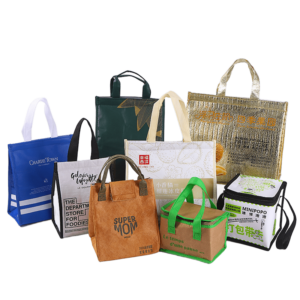In recent years, non-woven bags have gained significant popularity as a sustainable alternative to traditional plastic bags. Made from materials like polypropylene, these bags offer a range of benefits that make them a preferred choice for consumers and businesses alike. In this article, we’ll explore the key benefits of non-woven bags and why they are an excellent investment for both the environment and your daily needs.

1. Environmentally Friendly
One of the standout advantages of non-woven bags is their eco-friendliness. Unlike conventional plastic bags that can take hundreds of years to decompose, non-woven bags are made from recyclable materials. Many are designed to be reusable, reducing the demand for single-use plastics and contributing to a more sustainable future.
2. Durability
Non-woven bags are known for their exceptional durability. They are stronger than typical plastic bags, allowing them to hold heavier items without tearing or breaking. This makes them ideal for shopping, carrying groceries, and transporting various goods. Their sturdy construction means they can be used multiple times, further enhancing their cost-effectiveness.
3. Lightweight and Portable
Another key benefit of non-woven bags is their lightweight nature. Despite their strength, they are easy to carry and store. This portability makes them perfect for on-the-go lifestyles, as they can be folded flat and kept in a purse or backpack for convenient use whenever needed.
4. Breathability
Non-woven materials are inherently breathable, making these bags suitable for storing fresh produce and other items that require ventilation. This feature helps prevent moisture buildup and extends the freshness of food items, making them a practical choice for grocery shopping.
5. Customizable
Non-woven bags offer a high degree of customization. They can be produced in various colors, sizes, and designs to meet specific branding needs. Businesses can easily print logos or promotional messages on these bags, turning them into effective marketing tools while promoting eco-friendly practices.
6. Water Resistance
Certain types of non-woven bags are designed to be water-resistant, providing additional protection for contents during transportation. This feature is particularly useful for carrying items in unpredictable weather conditions, ensuring that the contents remain dry and intact.
7. Cost-Effective
When considering long-term usage, non-woven bags prove to be cost-effective. Although they may have a higher upfront cost compared to single-use plastic bags, their durability and reusability significantly reduce the need for frequent replacements, ultimately saving money over time.
Conclusion
In summary, non-woven bags offer numerous advantages that make them an excellent choice for environmentally conscious consumers and businesses. From their durability and lightweight nature to their customization options and eco-friendliness, non-woven bags are leading the way in sustainable packaging solutions. By choosing non-woven bags, you are not only making a smart economic decision but also contributing to a healthier planet.
Consider making the switch to non-woven bags today and enjoy the benefits they bring to your daily life!









